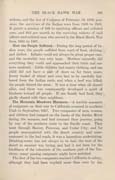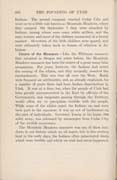
[p. 291]
The Mountain Meadows Massacre.—A terrible massacre of emigrants on their way to California occurred in southern Utah in September, 1857. Two companies of men, women, and children had camped on the banks of the Jordan River during the summer, and had resumed their journey, going by way of the southern route to the Pacific coast. They went through Beaver, Parowan, and Cedar City, and for people unacquainted with the desert country and unaccustomed to the bad roads, it was a hazardous undertaking. Drinking-water was not always to be had; the heat of the desert in summer was trying, and had it not been for the kindliness of the colonizers of the southern part of the Territory, many passing emigrants might have perished.
The first of the two companies reached California in safety, although they had been waylaid more than once by the

[p. 292]
Indians. The second company reached Cedar City and went on to a little vale known as Mountain Meadows, where they camped. On September 7 they were attacked by Indians, among whom were some white settlers, and the men, women, and most of the children massacred, in a brutal manner. Seventeen of the little children were spared, and were ultimately taken back to homes of relatives in Arkansas.
Causes of the Massacre.—Like the Whitman massacre that occurred in Oregon ten years before, the Mountain Meadows massacre has been the source of a great many false accusations. For years, however, the Indians had noted the coming of the whites, and they naturally resented the encroachment. This was true all over the West. Raids were frequent on settlements, and, as already explained, for a number of years there had been Indian depredations in Utah. It was at a time, too, when the people of Utah had been grossly misrepresented in the East by officials of the Government, and emigrants passing through the Territory would often try to precipitate trouble with the people. While some of the whites urged the Indians on, and even took part in the massacre, it was an act of lawlessness on the part of individuals. Governor Young at his home, 300 miles away, was informed by messengers from Cedar City of the terrible occurrence.
The Mountain Meadows massacre was one of those incidents in our history which we all regret, but in this western land in the early days, the Indians often perpetrated deeds which were terrible and which we wish had never happened.